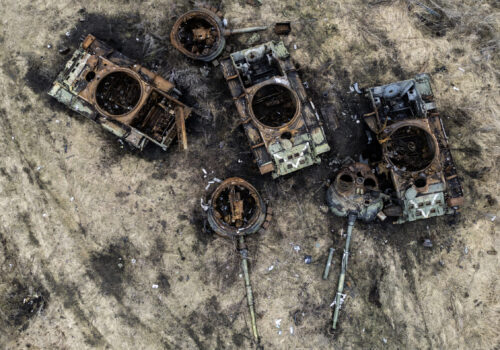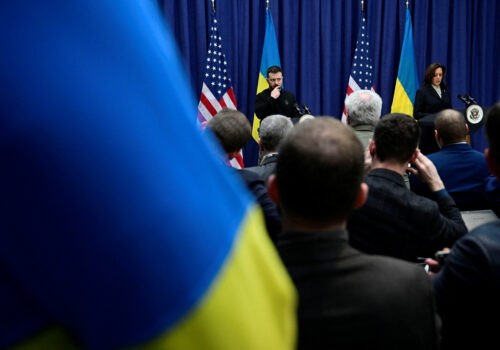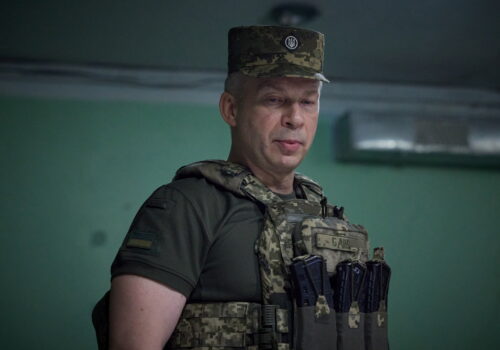What I heard in Munich: Europe gets a brutal awakening
One hour before the official start of the sixtieth Munich Security Conference (MSC) on Friday, a greeting from the Kremlin arrived. Russian opposition leader Alexei Navalny had died in prison. His widow, Yulia Navalnaya, entered the stage in tears shortly after and called for justice and for the world to come together and “fight this horrific regime.” The next day, I listened to Sviatlana Tsikhanouskaya, the Belarusian opposition leader, who told us that she had not heard from her imprisoned husband, Sergei, for more than a year. “I feel the dictators are testing their limits,” she said in response to Navalny’s death.
At the 2022 Munich Security Conference, just days before Russia’s full-scale invasion of Ukraine, the discussions were marked by a mixture of Western naivety and arrogance. One year later, four fears hampered action and a coherent response. This year was characterized by soul-searching and a brutal awakening for Europe. “Are we doing enough?” German Chancellor Olaf Scholz asked rhetorically as he dedicated his whole speech to Russia’s war in Ukraine. He emphasized that the threat from Russia was real and could spread if NATO’s deterrence and defense were not credible, and if military support to Ukraine failed.
French President Emmanuel Macron did not attend the MSC, but his words from Paris on Friday in a meeting with Ukrainian President Volodymyr Zelenskyy were telling. Instead of worrying about Russia being “crushed,” as he did last year following the MSC, he called Russia a “revisionist power” that in the past months had become increasingly aggressive “against all of us.” He warned that a new phase was beginning and that more countries had reasons to worry. For allies near Russia, this was old news, but still noteworthy coming from France.
The reliability of the United States was frequently questioned in discussions throughout the conference.
Zelenskyy, who spoke in-person in Munich, also posed a rhetorical question on Russia: “Do not ask Ukraine when the war will end. Ask yourself why is [Vladimir] Putin still able to continue it?”
The increased realization in Berlin and Paris of Russia as a threat, and Europe’s insufficiency to counter it, comes at a time when Russia is advancing on the battlefield, as seen by the fall of Avdiivka. Ukrainians are short of ammunition deliveries from the West and lack sufficient air defense to protect their land forces. As an illustration of its commitment to the war on Ukraine, Russia has shifted toward a war economy—supported by closer ties to China, North Korea, and Iran—and is dedicating nearly 30 percent of its fiscal expenditure on the military in 2024. The West has not managed to address the loopholes in its sanctions, a shortfall that benefits the Russian war machine. France last week uncovered a vast Russian disinformation campaign prepared for European states ahead of the elections to the European Parliament in June. Sabotage on critical underwater infrastructure in the North Atlantic and Baltic Sea has in the past year become so frequent that NATO has established special units to address it. In addition, US intelligence has reportedly indicated that Russia plans to put a nuclear anti-satellite weapon in space.
Meanwhile, the United States faces major challenges in its leadership on the Ukraine war. A constant message at the MSC, from European politicians to NATO Secretary General Jens Stoltenberg to the bipartisan congressional delegation, was that Congress urgently needs to pass the bill on military support to Ukraine. Although US Vice President Kamala Harris took the floor and stressed that a failure to secure critical arms to Ukraine would be a “gift to Vladimir Putin” and that “America will continue to lead,” the reliability of the United States was frequently questioned in discussions throughout the conference.
Former President Donald Trump’s outburst from the prior weekend that he would tell Russia to do “whatever the hell they wanted” with European allies who did not spend enough on defense sent shockwaves through European capitals. That Trump is leading against US President Joe Biden in some election polls made the statement even more scary.
In the corridors of the Bayerischer Hof Hotel, fear even loomed that at the MSC in 2025, Europe would be squeezed between a fascist Russia and an undependable United States—a Europe that would be pretty much on its own. As the big players in the Global South entered the stage at the MSC, it became clear that they were not particularly concerned about Russia, and they were little-engaged in Ukraine’s fate.
In light of such a future, after years of sleepwalking and dreaming of a quick return to a world in which Russia once again would be a trusted partner, 2024 seems to be the year of a brutal awakening for Europe. In 2024, only eighteen of thirty-one allies are estimated to spend at least 2 percent of their gross domestic product on defense, still a modest level compared to the Cold War era. Despite the fact that NATO at the Vilnius summit in 2023 agreed that 2 percent should be the floor, not the ceiling, for defense spending, Germany signaled at the MSC that 2 percent was its upper limit for the foreseeable future, and France just recovered up to 2 percent after dipping in 2023.
The recipe of the day at MSC was to strengthen “the European pillar” in NATO, a concept that has been floated for many years but with little progress. At a side event where I spoke on how to re-think Western policy toward Russia, I was asked whether a European pillar is a realistic proposition. My answer was yes, so long as European allies not only urgently increase defense spending, but spend it to fill identified gaps in military capabilities and invest in enablers needed for Europe to act without the United States if needed. Germany, France, and the United Kingdom would need to come together and lead. The United Kingdom clearly grasps the Russian threat, but is less influential in Europe since it left the European Union. Therefore, the key to a successful shift lies in Berlin and Paris. If Germany and France see Russia’s true face and realize that it is a severe threat to them as well, then this will be the defining moment for European defense. Europe has to credibly counter Russia, no matter who wins the US elections in November.
Anna Wieslander is director for Northern Europe at the Atlantic Council and chair of the board of the Institute for Security and Development Policy in Stockholm.
Further reading
Tue, Feb 20, 2024
Time is running out to help Ukraine and defend the West
UkraineAlert By
The West is potentially overwhelmingly stronger than Russia and can enable Ukraine to win. But this will require far more effort and speed, writes Victor Pinchuk.
Tue, Feb 20, 2024
Dispatch from Munich: The lessons of appeasement for US lawmakers withholding support for Ukraine
Inflection Points By Frederick Kempe
The lesson of Munich, then and now, is that the cost of countering a despot will only grow.
Fri, Feb 16, 2024
Can Ukraine’s new army chief overcome mounting battlefield challenges?
New Atlanticist By Peter Dickinson
As Ukraine’s new top general, Oleksandr Syrsky must now come to grips with a range of mounting difficulties facing the Ukrainian military.
Image: German Chancellor Olaf Scholz speaks at the annual Munich Security Conference, in Munich, Germany February 17, 2024. REUTERS/Wolfgang Rattay


